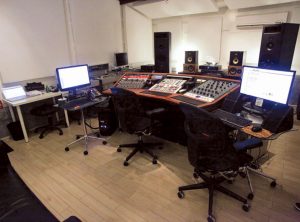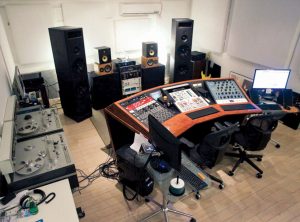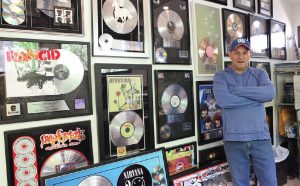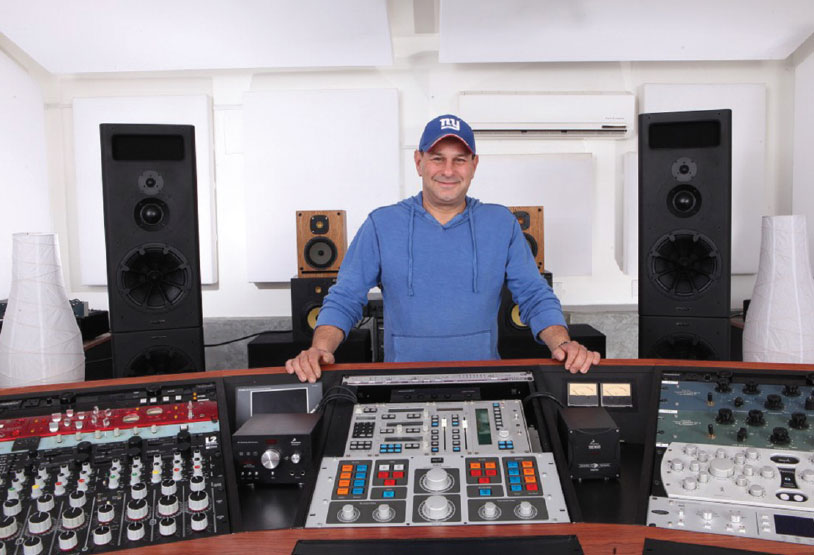A world-famous mastering engineer talks about the history and mystery of mastering
Interview by Paul Vnuk Jr.
Howie Weinberg is a mastering engineer with a career span of 35 years. Clients include: Nirvana, Beastie Boys, Pantera, Public Enemy, Slayer, Muse, The White Stripes, Sonic Youth, Run DMC, Tom Waits, Garbage, Smashing Pumpkins, Prince, Cypress Hill, Björk—and the list goes on.
Not long ago, I tracked and mixed an indie rock band from Chicago named Camera. When it came time to have their album mastered, Howie’s name was at the top of their wish list. The band and I were ecstatic that he was able to take on the project and give it his final touch. He was also willing to take the time to give us his advice and stories as well as a look into the evolution of the mastering process.—PV
On Mastering
You recently mastered ten tracks from the Chicago-based band Camera that I had the pleasure of mixing and recording. What are your thoughts on the tracks?
Howie Weinberg: It sounded good, really nice. The mixes sounded really big and tight. I like stuff that has a vibe already, where the basics are already there, rather than having to add or create something that doesn’t exist.
I know the band was a little nervous about getting back to you with some changes to track times and the overall bass level on one of the songs, because, well, you are Howie Weinberg!
That’s OK [laughs], that’s what I do! Never be afraid to tell somebody you are hiring what you want. That’s very important, because in the end that’s why you hire them.
After I master something, I want people to put it on and have it do something to them. Like “Wow, that’s got a great vibe or feeling”, not just “Oh, it’s got more bass.” I thought it went really well. Was everybody happy with the results?
They were blown away! We all were.
That’s what I like; I never get tired of hearing that [laughs].
Do you get a lot of work from indie labels or bands?
About half and half. I like the indie stuff, because even though some of the recordings aren’t as good quality as some of the major-label stuff, it can often be more cutting edge. In the end, if it’s good music, I don’t care where it was done or who recorded it.
You got your start at Masterdisk in New York…
I started in 1977 and I was the company’s first messenger. I also spent much of my time making one-to-one dupes of the 1/4″, 15 ips Dolby master tapes from Mercury and Polygram. Doing that I really got to start hearing what was out there in the world, and the music was great!
One of my earliest memories—when Saturday Night Fever came out, I spent all night making tape copies for every country in the world that was going to release it.
Did you go to school for mastering or audio engineering?
No. When I was 18 or 19, I left college and got a job at Masterdisk delivering packages, and I was just there watching everybody. Bob Ludwig was like my boss and he would show me around. After I graduated from tape copies, the company moved to a different space, and about four or five months in, a mastering room opened up, and lo and behold, here is my new mastering room. It was like, OK, here it is! Come on in… [laughs]
To be frank, the first few months I was a newbie and it was “practice makes perfect”! But I was young and had a brash attitude and I would do anything! And I did!
 You were one of the first guys to master hip hop records.
You were one of the first guys to master hip hop records.
I still remember, around ’81–’82, someone brought in the first real hip hop project. I think it was Kurtis Blow or one of those, Grandmaster Flash, and they just kept on coming, and all of a sudden in the first few months I had five or six gold records immediately.
They didn’t call it hip hop at the time, it was called rap music and I became the guy in town who would do rap music. And for about five years I did all the rap records in the area, working with guys like Rick Rubin and Russell Simmons who were all about the same age as me.
How did you make the switch from being the hip hop/rap guy to your work with rock bands like Nirvana and the Chili Peppers and such?
Doing hip hop just got my foot in the door and got me noticed. A lot of the guys who did hip hop in the beginning, like Andy Wallace, the Lord-Alge guys, they were all doing dance records and hip hop-type records before they ever did any major rock records; there is no real difference—great music is great music.
How has mastering changed over the years?
In the early ’80s, 15 ips 1/4″ Dolby A was the format, 1/2″ was not invented yet, certainly digital wasn’t. In those days it was all analog, vinyls and cassettes, and then CDs came into play, and I remember it was like, “I can now put some more bass on here and if I put more bass on here it’s not going to undercut, and if something comes in out of phase it’s not going to ruin my day where I will have to keep recutting it.”
There was a little bit more of an art to it then, some of that has disappeared with digital media. I would say that 98% of vinyl cutting now is done from digital tapes where you just push Play and you try and fit the music on there, rather than master everything from scratch—let me tell you, that was some work!
 So what does a typical session look like now? Do you have clients there or not?
So what does a typical session look like now? Do you have clients there or not?
I might get a project from France, another from Germany, followed by one from England and then maybe two from New York, so it’s a lot less client-attended now and a bit more like file management, which I kind of like and don’t like.
When clients come in they also want to hang out, which is not exactly conducive to me focusing really well; but I do like it when the clients are there, because I get the feedback from the client immediately.
But since most clients don’t show up these days I have learned how to work by myself really well and at my own pace. Since I can’t get feedback from a client I just get feedback from my own head [laughs], “This will be right, this is what I like…”
About how many albums do you do in a week?
I work on about five to eight albums a week now.
Do you have a general workflow or even a typical chain you stick to?
Obviously I do have a chain that I know works really well, some EQs and curves and all of that other stuff, and eventually I will share that with the world and make my own plug-in, but that’s next year… [laughs]
Generally speaking I have a lot of different variables I can work with. Sometimes it sounds better with the EQ before the compressor, sometimes the compressor before the EQ because the compressor will do a certain thing and you want to eq off of that.
I have an SPL Master Bay, so all my gear goes into one box and then it goes into the mastering console, so I can take my compressors or EQs or whatever and put them into any direction I want. It makes workflow really easy.
What about your personal gear choices?
When I started this studio here, I set out to have the best equipment money could buy and charge very fair rates. Obviously the equipment is key to everything.
I have an SPL mastering console, which is one of my major weapons. The 120V consoles that SPL makes have much more headroom than a 60V analog console and you can cut really hot records a lot cleaner. When I was in New York I had a Neumann console, which had a big sound, but it had limited headroom. I also use the SPL EQ.
For digital gear I have Pro Tools, I have three Antelope Audio clocks and I also use their converters. I try and convert this stuff to analog really well, do all the processing in analog and then dump it back into digital, and I use a Merging Technologies Pyramix system for that, which I think is the best digital workstation in the business—I have two of those.
So your main DAW for mastering is the Pyramix?
Absolutely, they really did their homework, it’s very easy for editing, very logical and it sounds great! I want my analog chain reproduced as close as I can, and the Pyramix system does this.
You have a Focusrite Red Compressor?
I use that once in a while, and I have a custom-made SSL compressor, I have a Waves L2. I have the big Sontec EQ, the mastering one, and I have the smaller GML type from Sontec which is much more vibey, and I use the SPL EQ which is very much like a Pultec with a big-ass bottom end and a big wide sound; and I have two EQP-1A Pultecs in mint condition. I have a lot of processing.
What about your digital side?
I have a Weiss digital console that has de-essing, and six bands of EQ, and the Pyramix has EQs and compressors that sound amazing and most people don’t even know about. I have the Slate Digital tape plug-in and mastering plug-in on my system that’s really good.
Some mastering engineers are either all analog or all digital…
Some analog stuff sounds really good, but there is a cost-versus-effectiveness to analog recording that’s beyond a lot of people’s means; and the digital stuff has gotten really good. The plug-ins are great and you can blend both worlds really well.
It’s the way a lot of people are mixing nowadays, they mix in the box, but they have tons of analog outboard gear as well. I don’t master in the box because I have the SPL console and everything goes through there. Basically I am an analog guy, but I have done projects in the box that still sound fantastic. It’s all only as good as the operator, you know. You can have all the gear in the world and if you don’t push the right buttons and twist the right knobs it ain’t good.
Now that CDs are nearing the end of their life cycle, where do you see digital audio going?
I usually master at 24/44.1 but lately there is a big market for hi-rez stuff, so I have been mastering a lot for 24/96. I have been doing a lot of mastered-for-iTunes stuff and a lot of HD tracks. This is the future of audio; eventually a consumer will be able to download a 24/96 file. When I play back tracks I have done at 24/96 it’s just a perfect mirror image that 16/44.1 does not give you.
Any dos and don’ts for clients, or common mistakes you see from project/home studios?
The first do-and-don’t I have come across too many times is: If you are making records and you are happy with the way they sound, it’s not a good idea to compare your records against commercially-released records that could have had a $200,000 budget using the best mixers in the world in some of the best studios in the world, and then go “Oh, my mix does not sound as good as that.”
Or clients send me their music and say, “Well, you have done these kind of records, can’t mine sound like that too?”
I try like hell, but you have to be realistic on what you have. What I am trying to say is you don’t necessarily have to compete with them; you just have to make good music, OK? I think in the end people are just way, way too concerned about certain production values rather than musical values.
What about the current debate on final mixing levels?
I just got a project from a really well-known producer and I called him up and said it sounded great, but you know what? Your files are too small.
A lot of times if your files are too small, you are not using up all your bits and numbers. You want to have a nice fat file that’s not overly done, so somebody like me can get the files and have room to move on it.
Then the opposite is when I get files that are totally slammed and squared out, it gives me fewer options. I like nice loud files, but I don’t want them crushed. There is a happy medium.
You want to get files back from me that sound better, and if files that I get are so loud and crushed, I can’t even match their levels and that’s going backwards. My advice is, do two versions—one that you give to the client for listening that’s a little more crushed so the client can hear it louder, and one that’s nice and dynamic but not too compressed, that gets sent to mastering.
What is your opinion on adding bus compression to the final mix?
Just do it artistically, it’s really important not to use equipment just for the sake of turning it on, you know what I mean? Use it for the benefit of the music, not just because you have it; like “I have five different plug-in EQs—I should use them all!” Go by the adage “less is definitely more”!
You want to record stuff that has what I call the turn-up curve! You know how you can play some records and as you turn them up they just keep sounding better and better, where as some records, you get to a certain point and it’s ARRRGGHHH!!! You can’t turn them up, you know what I’m saying?
What about low and high end? Which one is the more problematic?
I think it’s both. The problem is a lot of people are working in home-type studios with not the most perfect monitoring systems or recording environment. That’s OK in the end if the record has a vibe. I have noticed that a lot of the albums I am getting, people are doing really good jobs. They watch videos and they read the magazines and the forums and they practice and I think people are doing their homework.
I think in this day and age the equipment has gotten really good, and skills have gotten really good, and there’s really very few records that I get in that just sound like crap.
Do you ever turn any projects down?
That’s a big grey area, because sometimes I may think something is crap, but the band loves it and you have insulted them [laughs]. Generally speaking, if I get something in that isn’t very good I will let them know.
Do you have any advice for the budding beginning mastering engineer?
If you are really into finished audio rather than recording, try it! A lot of guys these days who try this also have a really good knowledge of recording and mixing as well.
See, I didn’t do any recording or mixing, I just don’t have that background, I am not a musician, I am a specialist. I basically listen from the standpoint of your average Joe Shmoe consumer who takes the record and puts it on and listens in their car or their boom box or iPod. I approach it like that.
What is your take on the dreaded Loudness Wars?
I think people need to start thinking about other things! If an artist wants to make their record a certain way, they should! You as a consumer should not be worried about it. It’s gone a bit overboard! I have done records where people have complained it’s too loud and I play the thing and think, “It doesn’t sound bad to me.”
I have been on both sides of the coin and I can go either way, in the end it’s what the client wants. If they want it super loud to compete with the next guy, I am fine, if they want it nice and dynamic I am fine with that too.
 Last question—the Howie Weinberg mastering philosophy?
Last question—the Howie Weinberg mastering philosophy?
Be less concerned with technology and more concerned with artistic endeavors. The equipment is great, but it’s only as good as the artist who uses it. Having great-sounding equipment does not necessarily mean you will have great-sounding or great-engineered records!
But, but…! Suffice to say if all the combinations work, if you have great equipment, great engineers, great artists and great music… then you have magic!
For more information, visit howieweinbergmastering.com. Photos by Evans Vestal Ward, courtesy of Howie Weinberg Mastering.
Paul Vnuk Jr. ([email protected]) would like to thank Howie for his time and cooperation in the interview process, and for his work mastering Paul’s mixes of the Camera album.


